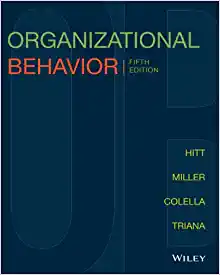It appears that nearly all of the concepts in this chapter on conflict, negotiation, power, and politics
Question:
It appears that nearly all of the concepts in this chapter on conflict, negotiation, power, and politics differentiate between power for one’s self-interest and power for the organization’s interests. For example, it is said that whether or not the exercise of power is harmful depends on the intent of the person holding the power. A manager who exercises power to meet organizational goals is using power in a positive, productive way. In contrast, a manager who exercises power to promote his or her personal interests, at the expense of others, is misusing power. Both kinds of power flow to individuals from others and are used by individuals on others. The point at which power becomes negative or positive is rooted in the ethos of each individual.
Students may learn to better manage their use of power. They may see better how others use them in power moves by summoning the image explored in this original exercise. It is the sight and sound of the tear. Thus, this exercise is called Where does the tearing begin?
Questions:
1. Provide your learners with four blank sheets of paper.
2. Remind them of the two main reasons for power to be strategic to their own lives in organizations. One is for the person to achieve his or her own goals. Another is for that same person to gain power to achieve the organization’s goals.
3. Ask them to print “My interests” at the center of one of the sheets of paper and “My organization’s interests” on another.
4. To ground this exercise in something they all share, ask them to jot down at least three of the things that they want to gain personally by what they do in your course. Then, on the other, jot down at least three things that all in the class, including you, are working to accomplish together.
5. Tell them that when there is extensive overlap, acts of influence are likely to obtain outcomes that are good for both person and others in the organization. This is compatible with their personal state of integrity, the quality or condition of being whole.
6. At this point in the exercise, ask them to make the two papers overlap completely. Ask if there are many moments when, in even the best organization in which they have worked, there is a full match between the organizational goals they serve and their personal interests and goals. Seek examples.
7. It is likely that each situation faced presents a different degree of goal congruency from 100% down to 0%. To represent this range, ask them to very slowly slide the two sheets of paper apart. This reduces overlap. They stop doing this when you tell them to stop.
8. Have them stop at mid-point, where there is about as much of the personal interests sheet showing as the organizational interests sheet. Now, ask them to talk about what might be going on in their minds at this critical juncture. Here is when they are still drawing power to meet some organizational goals and their own, but are sacrificing some of their own and some of the organization’s. Remind them that they are pulling away from what others value and may be creating reasons for conflict. Seek examples of how this might come out in the class’ organizational behavior.
9. Now, have them resume very slowly drawing the two papers apart. They are exposing their greater need to use power to serve themselves. Ask them to stop moving the papers at the moment that they feel discomfort at becoming one who would exploit others in this course to meet their own interests.
10. When all have stopped, ask them to talk about why they stopped. Afterwards, offer this theory. They stopped at their tearing point. Beyond this point they would be putting a painful tear in their personal integrity. Ask if and how they think these tears, if they actually occurred in your course, could be repaired.
11. Finally, order them to pull those two sheets of papers completely apart, leaving a wide gap between self and organizational interests. Shift the focus to the examples in this chapter, like that of Disney’s Eisner or those in current news stories. Ask if it is possible for people in an organization to allow members, particularly managers, to have and use power for completely self-serving reasons? If not, why not? If so, how do they get away with it?
Step by Step Answer:






